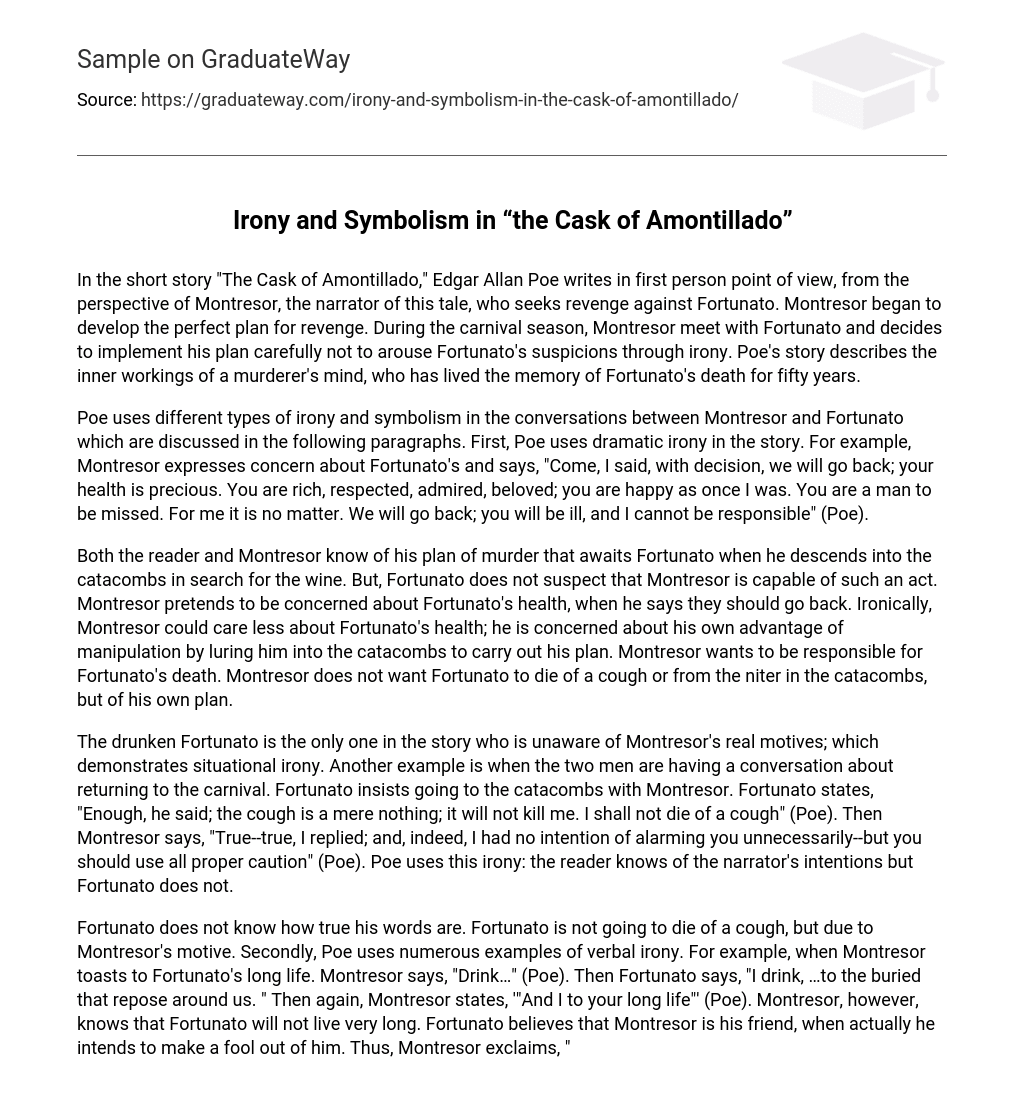Edgar Allan Poe’s “The Cask of Amontillado” is a short story written in first person. It is narrated by Montresor, who seeks revenge against Fortunato. Montresor carefully plans his revenge during the carnival season, ensuring that Fortunato remains unaware. The story delves into the thoughts of a murderer, haunted by the memory of Fortunato’s death for fifty years.
The discussions between Montresor and Fortunato in Poe’s story incorporate various forms of irony and symbolism, which will be examined in the subsequent paragraphs. The first type of irony employed by Poe is dramatic irony. For instance, Montresor expresses his concern for Fortunato’s well-being and states, “Come, I said, with decision, we will go back; your health is precious. You are rich, respected, admired, beloved; you are happy as once I was. You are a man to be missed. For me it is no matter. We will go back; you will be ill, and I cannot be responsible” (Poe).
Both Montresor and the reader are aware of Montresor’s plan to murder Fortunato once they reach the catacombs in search of wine. However, Fortunato remains oblivious to Montresor’s sinister intentions. Montresor cleverly feigns concern for Fortunato’s well-being by suggesting they turn back. Ironically, Montresor has no genuine concern for Fortunato’s health; his true motive is to manipulate him and lure him into the catacombs to carry out his plan. It is Montresor’s desire to take responsibility for Fortunato’s death, not to leave it to chance such as dying from a cough or the niter in the catacombs; he wants his own plan to be the cause of Fortunato’s demise.
The situational irony in the story is exemplified by the fact that Fortunato, who is drunk, remains unaware of Montresor’s true motives. Another ironic moment occurs when the two men discuss going back to the carnival. Despite Fortunato’s insistence on accompanying Montresor to the catacombs, he dismisses his cough as insignificant, saying it will not kill him. Montresor, knowing his intentions, responds by telling Fortunato to be cautious. This use of irony highlights the disparity between the reader’s knowledge and Fortunato’s ignorance.
Fortunato is unaware of the truth behind his own words. It will not be a mere cough that brings about Fortunato’s demise, but Montresor’s hidden motive. Poe employs various instances of verbal irony to illustrate this point. For instance, when Montresor raises a toast to Fortunato’s long life, saying, “Drink…” (Poe). In response, Fortunato remarks, “I drink, …to the buried that repose around us.” Montresor then adds, “‘And I to your long life'” (Poe). However, Montresor is fully aware that Fortunato’s life will not be long-lived. While Fortunato believes Montresor to be his friend, he is actually being deceived and set up for ridicule. Hence, Montresor proclaims, “My dear Fortunato, you are luckily met.”
In this quote from Poe’s “The Cask of Amontillado,” Montresor ironically compliments Fortunato’s appearance despite his true feelings of hatred towards him. Montresor acknowledges that he has doubts about the Amontillado that he recently received, implying that he plans to deceive Fortunato. Montresor refers to Fortunato as “dear” and compliments his clown costume, which aligns with Montresor’s intention to make a fool out of him. Despite this, Montresor sarcastically assures Fortunato that he will not take advantage of his good nature. Through these ironic situations and the use of symbolism, Poe explores the theme of revenge in this short story.
The characters’ names in the story are symbolic. According to Womack, the names mentioned – Fortunato, Luchesi, and Montressor – suggest treasure. Fortunato means “fortunate” in Italian, while Luchesi means “lucrative.” Another symbolism is found in the sherry, where the dry sherry from the Spanish mountains contrasts with the gloomy depths of Fortunato’s tomb. Montressor tells the story of the “cask” of amontillado, which lures Fortunato into the “casket” he is buried in. This revenge tale revolves around Montressor, who plots and executes a plan to eliminate Fortunato. The reason behind Montressor’s villainous behavior is somewhat understated. Montressor, an unreliable narrator, claims to have endured “the thousand injuries of Fortunato I had borne as best as I could” (9750). This statement not only exaggerates but also raises questions about Montressor’s motives.
After reading this story, I was struck by Montressor’s descriptive accounts of how Fortunato criticized and humiliated him. As readers, we are left unaware of the reasons behind Fortunato’s belittlement. It is possible that Montressor may have provoked such behavior from him, but since there is no objective evidence indicating the true aggressor, we can only speculate. Montressor’s brilliant plan involved deceiving Fortunato into visiting his home under the pretense of sampling a wine called amontillado.
The reason for this action was his knowledge that fortunato also appreciated fine wines. We continue to witness montressor’s cunning and the irony behind his concern for fortunato’s well-being. “Come,” I declared firmly, “let’s return – your health is invaluable. You possess wealth, respect, admiration, and love – you are as happy as I once was” (77). In the aforementioned paragraph, montressor’s display of compassion towards fortunato is a prime example of reverse psychology in action. Montressor foresaw that by presenting himself as fortunato’s concerned friend, his plan would proceed flawlessly.
It is understood that Montressor desired to seek vengeance on Fortunato. However, the text does not reveal when this would occur. Thus, we can infer that the carnival provided the perfect setting for Fortunato to become intoxicated. This enabled Montressor to proceed with his plan to kill Fortunato. Ultimately, Montressor achieves his revenge against an unsuspecting Fortunato by the end of Poe’s story. Fortunato’s fondness for wine ultimately leads to his demise. Once again, the reader is reminded of the coat of arms and the Montresor family motto. This emblem symbolizes Montressor’s wicked nature, which resembles a serpent seeking revenge.





